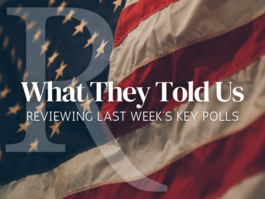Voters Grow More Critical of Trump’s Economic, Foreign Policies
Perceptions of how President Trump is dealing with the economy and foreign policy have fallen slightly as his second year in office comes to a close.

Perceptions of how President Trump is dealing with the economy and foreign policy have fallen slightly as his second year in office comes to a close.

If Democrats are optimistic as 2019 begins, it is understandable.

The numbers are small, the terrain unfamiliar, the cast of characters chaotic and the clash of interest hard to decipher.

On the heels of President Trump’s planned removal of troops from Syria, voters are far less likely to think the United States needs to be more hands-on in the Middle East.

President Trump’s declaration that he is pulling U.S. troops from Syria has many worried about the nation’s future at the hands of the radical Islamic State Group (ISIS). He said earlier in the year that the “primary mission” in Syria was to get rid of ISIS and that America had “completed that task.” Voters agree we’re winning the war against ISIS, even if they still consider the terrorist organization a major threat.

The Trump administration is planning to roll back race-based Obama-era school discipline policies, arguing that they have led to more lax discipline overall and a rise in school violence. Americans overwhelmingly agree that a student’s racial background should not be a factor in discipline.

President Trump, intent on getting U.S. troops out of the Middle East, has angered hawkish members of both major political parties with his decision to withdraw from Syria. Voters tend to oppose his decision as well.

When it comes to Silicon Valley Santas bearing gifts for our children, I am a big Scrooge. Every responsible parent should be, too.

My New Year's resolution: Make a careful distinction between speech and violence.
America's First Amendment says "yes" to most speech, including speech that criticizes, insults -- even speech that promotes hate. But the law applies only to government.

In one of the most remarkable Abbott and Costello routines in modern times, the economic wizards at the Fed again raised interest rates on Tuesday. Their crackerjack logic for doing so is to steer America on a course toward recession so they have the tools in hand to end the recession that they themselves created. Can anyone tell us who's on first?

"Deck the halls with boughs of holly," goes the old Christmas carol. "'Tis the season to be jolly." Yet if there were a couplet less befitting the mood of this capital city, I am unaware of it.

Today is Christmas, and most still consider it an important and holy day.

Forty percent (40%) of Likely U.S. Voters think the country is heading in the right direction, according to a new Rasmussen Reports national telephone and online survey for the week ending December 20.

The hour is getting late, but quite a few Americans have not yet begun to shop.

A panel investigating the massacre at a Parkland, Florida high school earlier this year has recommended that certain trained, vetted teachers be allowed to carry firearms in school, a proposal supported by the Trump administration’s Federal Commission on School Safety. Parents of school-age children continue to think that's a good idea.

Liberals are supposed to feel other people's pain. Now, they seem more intent on inflicting it.

Four days before Christmas, Congress entered a partial government shutdown over the showdown for border wall funding, while procrastinators scrambled to do last minute holiday shopping.

Today is expected to be one of the busiest travel days of the year, but most Americans are staying put this year.

"We have defeated ISIS in Syria, my only reason for being there," wrote President Donald Trump, as he ordered the withdrawal of all U.S. forces from Syria, stunning the U.S. foreign policy establishment.

Though some consider the tradition of sending Christmas cards a relic of the past, nearly half still plan on mailing them out this year.